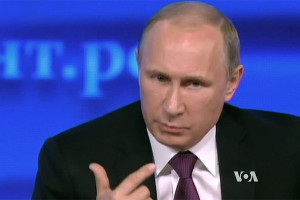Russians Won’t Overthrow Putin but May Cease to Pay Attention to Him, Commentators Say

(Paul Goble – Window on Eurasia – Staunton, November 3, 2016)
Russian historian Yevgeny Ponasenkov says that Russians won’t overthrow Vladimir Putin because the masses have never overthrown any Russian ruler, only those close to the throne have done so. But Badma Burchiyev, a specialist on the North Caucasus, says they may do something even worse: they may stop paying attention to him.
In an interview with Kyiv’s Apostrophe news portal, Ponasenkov says that it is “comical” to talk about “the Russians overthrowing dictators” because the population “over the course of its history has never overthrown anyone. Tsars were overthrown by their brothers and some aristocrats” (apostrophe.ua/article/world/ex-ussr/2016-11-02/pochemu-rossiyane-nikogda-ne-svergnut-putina/8065).
So too, he continues, “in 1991 no Soviet people and civic Russians in their millions overthrew Grobachev or the Central Committee.” In the future, “no one will overthrow anyone either,” even if there are mass demonstrations in Moscow and other cities as a result of a deepening economic and social collapse.
But that doesn’t mean that the attitudes of the population toward the ruler and his regime are irrelevant. Indeed, Byiurchiyev says, a regime like Putin’s “which has given birth to a critical mass of the silent majority has condemned itself to collapse and society to coexistence with terrorism” (kavpolit.com/articles/molchalivyj_mogilschik_vlasti-29312/).
“A large part of Russians prefer not to have anything to do with the state, sociologists say,” the analyst says. That means that the state has less ability to push them in the directions it wants or to rely on them for real as opposed to formal support. Indeed, he adds, however “paradoxical” it may sound, this distrust is behind the 86 percent who say they support Putin.
“Politics is being transformed into a television serial which does not have any relation to reality, where the positive hero conducts an unending struggle against internal and external enemies.” That conclusion is supported, Byurchiyev says, by Lev Gudkov of the Levada Center and by Dmitry Rogozin of the Russian Academy of Economics and State Service.
“To pass unnoticed by the state is only in appearance an infantile strategy,” they argue. “In fact, it is rational” because it allows the people to do what they want whatever the powers that be say, something that guts much of their supposed power.
Byurchiyev draws most of his argument on these points, hwoever from the writings of French sociologist Jean Baudrillard (1929-2007) who wrote about the ways in which the emergence of a silent majority and even its production by authoritarian rulers who view it was a support can end by destroying its authors.
According to the French sociologist, “the masses, cut off from any participation in politics function ‘like a gigantic black whole, piteously rejecting, swallowing or distorting all energy flows and communications with which they come into contact.” As a result, “any information – political, pedagogical or cultural – is transformed into nothing.”
Or as Baudrillard put it in lapidary language, “rational communications and the masses are incompatible” because the silent majority prefers not rationality but circuses.
“For a long time, it appeared that the apathy of the masses should be welcomed by the authorities,” he continued. “The authorities had the conviction that the more passive the masses, the more effective it would be to rule them.” But the indifference of the masses produced by such regime strategies becomes its gravedigger.
But even before it does that, the silent majority is condemned by its indifference to “coexistence with terrorism” because that gives some people meaning. “The authorities who openly falsify elections are deprived of legitimacy; the state which the majority of citizens avoid having contact with loses meaning.”
A more immediate consequence of this trend, Burchiyev continues, is that “the Russian Federation today is an enormous territorial formation where the population cannot define itself by its past or its future and is trying to be invisible in the future.” That creates a hollowness in the state that even its own bombast cannot hide for long.
[Article also appeared at windowoneurasia2.blogspot.com/2016/11/russians-wont-overthrow-putin-but-may.html]
